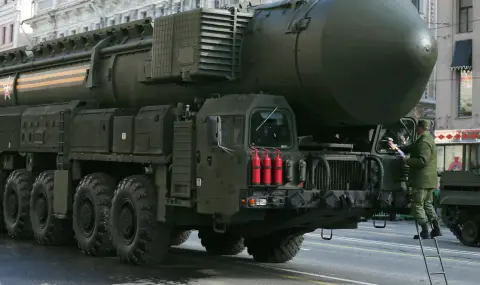Russian President Vladimir Putin signed the country's updated nuclear doctrine, which expanded the list of conditions under which Russia could launch a nuclear strike. The new version states that Russia reserves the right to use nuclear weapons in the event of aggression by a non-nuclear state if it is backed by a nuclear power.
Such an attack, including with conventional weapons, would be considered a joint attack against Russia and could lead to a nuclear retaliatory strike. Although the text does not specifically mention countries, in the context of the war in Ukraine it is clear that Ukraine, which is a non-nuclear state, and its NATO allies (the nuclear powers USA and France) are meant.
Old wording
In an interview with DV, the independent Russian expert on nuclear weapons Pavel Podvig emphasizes that this wording has existed since 1995. But at the time, Russia saw a NATO nuclear power and its non-nuclear ally as a potential source of aggression.
The new doctrine also states that aggression by a country that belongs to a military alliance – for example NATO - against Russia or its allies will be seen as an aggression of the entire Alliance.
More "war dangers"
The document also states that the Kremlin can approve the use of nuclear weapons, even if only in the presence of “reliable information about a massive strike with air and space assets” that have crossed Russian borders. This includes planes, missiles and drones. The new document expands the list of so-called military threats that justify triggering the nuclear deterrent mechanism. They already include the possession of weapons of mass destruction of any kind that could be used against Russia, as well as the conduct of military exercises near the Russian borders.
According to the new doctrine, Russia can use nuclear weapons if there is a “critical threat to the sovereignty of the Russian Federation and conventional weapons”. What is meant by “critical threat” is not explained.
The definition of "critical threat" is key
Pavel Podvig points out that in the earlier version there was only talk of a threat to the “existence of the state itself”. Asked whether the Ukrainian military's occupation of parts of Russia's Kursk region or US-armed missile attacks on Russian airfields pose a threat to Russia's territorial integrity, Podvig said it was unclear what kind of threat would be considered critical.
„Such things are deliberately not defined - in such documents there is always room for different interpretations”, says the expert and gives an example of the possible loss of the Ukrainian territories annexed by Russia: “Moscow could, for example, claim that this poses a critical threat to its territorial integrity, but since no one in the world recognizes these territories as part of the Russian Federation, there is no way this can be taken as a threat to Russian sovereignty“.
Is nuclear war becoming inevitable?
According to Pavel Podvig, however, the new doctrine in no way means that Russia is already preparing for a nuclear war. He believes that the use of nuclear weapons against Ukraine is very unlikely: “From a military point of view, it would not make sense, because the situation on the front will not change. And the reaction to such an action will be extremely negative, and from all other countries”, says the expert.
The document simply aims to preserve Russia's right to use nuclear weapons in one situation or another. “It does not say “we will use them” or “we are obliged to use them“. Everything is left to the discretion of the one who decides to use them.“ The expert also says that this is a declarative document that is aimed at the West and explains to all possible opponents how Russia sees the role of nuclear weapons in ensuring its security.
Message to the West
The message is also to politicians from the West, which is evident from publications in the Russian media. For example, pravda.ru writes that although the doctrine does not contain radically new provisions, its significance lies in the fact that it sends an important signal to other countries.
„Countries that are ready to enter into conflict with Russia risk receiving a nuclear response. This doctrine is above all a message to the outgoing American administration,”, sums up the Russian political scientist Nikolai Kostikin.
Kremlin spokesman Dmitry Peskov did not respond to the question of whether there was a connection between the update of the doctrine and the US authorization of the Ukrainian military to use US missiles on Russian territory. According to Peskov, the Russian president's order to renew the nuclear strategy was given a long time ago.
